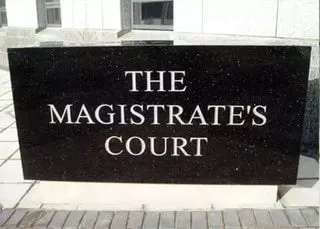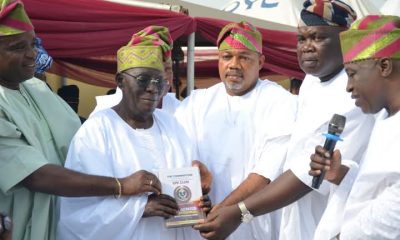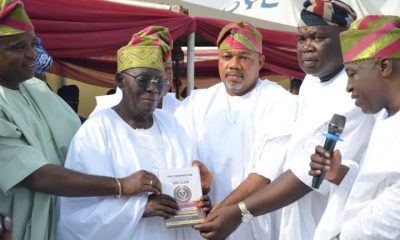News
Governor Fayemi Headlines NIJ 6th Convocation Lecture

Interrogating the democratic landscape of the country, offering an accessible platform for crucial issues of national discourse, and keeping the society duly educated and informed constituted some of the focal points of Ekiti State Governor, Mr Kayode Fayemi as he addressed a myriad of academicians, journalists and graduands during the occasion of the 6th Convocation of the Nigerian Institute of Journalism.
The Convocation lecture held on Monday, November 29, 2021 at the main campus of the Nigerian Institute of Journalism, Ogba, Lagos State held as a prequel to the 6th Convocation/50th anniversary of the institution.
Present at the convocation lecture were the esteemed members of the fourth estate of the realm as well as seasoned academicians and members of the governing council of the institute. They include – Mr Aremo Olusegun Osoba (Chairman, NIJ Governing Council), Mr. Gbenga Adefaye (Provost) Mr Sam Amuka, Mr Felix Adenaike, Dr (Mrs.) Doyin Abiola, Mr Ray Ekpu, Alhaji Garba Bello Kankarofi, Mr Lanre Ogundipe, Dr Rotimi Oladele.

Others are Mrs. Olufunke Fadugba, Mr James Akpandem, Mr Wale Edun, Dr. Sanya Awosan, Mr. Sheyin Ephraim, Mr. Mustapha Isah and Mrs. Patricia Kalesanwo.
Delivering the opening remarks, the Vice Chairman, NIJ Governing Council, Mr Ray Ekpu delved into some of the critical topical concerns that remain a bottle-neck in Nigeria’s discourse on national development.
“Our country remains a stranger to peace, a stranger to security, and a stranger to safety. Our security personnel have also put in their best, according to their abilities, but we remain a people harassed every day, a people, and a people killed every day,” Mr Ekpu said.
“According to the International Organisation for Peace Building and Social Justice, by last year, more than 27, 000 civilians had been killed by Boko Haram. This figure is more than the number the ISIS killed in Iraq and Syria put together.”
“Many of our citizens – men, women, children, boys, girls, farmers, traders, schoolchildren, travellers, politicians, taxpayers, are still in captivity today. According to the global terrorism index, Nigeria is the world’s most dangerous country after Afghanistan and Iraq. In addition, about three million of our people have internal and external displacement status.”

“From the foregoing, we can confirm that the nation is in serious crisis. The nation is in need of redemption, a nation in need of rebuilding. Building a nation is a tough job, it is a partnership, a coalition, an alliance between those who rule and those who are ruled. That will determine what kind of nation they want to build. The leaders have the major responsibility to lead the way, passionately, effectively, and certain in whatever they do. Most followers will do what is right if they perceive that leaders have done what is right.”
“The crucial question is – what sort of nation do we want to build? I have no answer to give you. I only have questions to pose. Do we want a nation where equality, fairness and justice will reign supreme? Or one in which injustice, unfairness, parochialism, favouritism, will be the order of the day? Do we want a nation where security people will shoot and kill defenseless, unarmed and peaceful citizens sitting on the floor, and singing the country’s national anthem and holding the country’s national flag?”
Read Also: NIJ Convocation Lecture: Media, National Security And Nation Building By Kayode Fayemi (Full Text)
“Do we want a nation where we can sit to collect lands belonging to private individuals and state governments and give it free to private citizens called herders? Do we want a nation where people can rape, kill, and dispossess people of their farms? Do we want a nation where some students of some parts of the country can gain admission into tertiary institutions wth a score of 100 while a student from another part of the country with a score of 300 cannot gain admission into those tertiary institutions? Do we want a nation where the leaders will set up a committee to find a solution to our institution’s problems only to allow the report of the committee to gather cobwebs, unattended to?”

“Do we want a nation where the regulator of electronic broadcasting will stop a journalist from publishing the truth, the whole truth and nothing but the truth? Do we want a nation where some leaders will advocate amnesty for kidnappers, killers, and murderers while we send petty thieves to jail? Do we want a nation in which someone came fourth in an election will be promoted to first position and sworn in as a ruler of a state?”
“Do we want a nation where killers and kidnappers are paid ransom from the taxpayer’s fund, while retirees are being owed pensions and gratuity for years? Do we want a nation where a small clique of political and bureaucratic elite holds the nation by jugular, and run it aground with discriminatory, parochial and nepotistic policies?”
The guest lecturer, Governor Kayode Fayemi of Ekiti State, whose lecture was in large part a response to the questions posed by Mr Ekpu in his opening remarks took a historical approach to his lecture, duly highlighting the crucial role the media has always played in national security and nation building even before Nigeria’s transition to self rule and consequently, democratic rule.
“I’ve been asked to speak on the topic “Media Security and Nation Building” at this convocation. My assumption was that my brother, the provost wanted me to take a synthetic thought and intersection between the media, national security and nation building. In doing this, I thought it wise go to into a historical excursion into the place of the media in Nigeria’s nation building dialogue. It has often been stated that the issue of what eventually became known as the Nigerian media is older than the history of the colonial and later post-colonial entity named Nigeria.”

It is evident in the pivotal role of the Nigerian press in the struggle against colonial domination and the struggle for the country’s independence as well as the struggle against military rule, civilian misrule and defence of democratic governance. Sadly, sometimes, it is also evident in the role that the section of the media plays in moments of national crisis, such as the year preceding the civil war.
It must also be pointed out, that the nature of the history of the Nigerian media vis-a-vis the formation of the modern state has also helped the Nigerian media in developing and expanding the basis of autonomous action and maneuvre in relation to powerful forces in the State and society.
The Governor, who has previous worked as a campus journalist in his formative years further outlined some succinct role which he believes the media must continue to play to ensure that the goal of ensuring an accountable democracy and an egalitarian society does not fall into the doldrums.
“In any liberal or democratic set-up, the media are expected to perform certain functions within the political system. These include sustenance of development, both positive and negative which affects citizens welfare, agenda setting, that is identifying key issues in the polity, offering accessible platform for intelligible advocacy by public servants and interest groups, serving as a bridge for dialogue across a wide range of views, holding public officers accountable for their use or misuse of power, educating and motivating the citizenry of our politics, including electoral politics and general participation in civic life.”

“It is in the light of these that media scholars have concluded that a democratic system of government that is not supported by a free vibrant and healthy media system represents a nominal rather than a new system of democratic decision making. Modern mass democracy is possibly inspired by modern mass media, the access that the media affords ordinary citizens , it has been noted, creates conditions for dialogue between the rulers and the ruled. This the time when the media must propose inclusion, rather than sectarian exclusion.”
Fayemi also gave his “two cents” to this year’s graduands at the convocation ceremony. He admonished the neophytes about to plunge into the world of mainstream journalism to always remember the crucial role information dissemination plays in any democratic society and uphold the ethics and the basic canons of the profession in service of the truth.
“Having attempted to cross the necessary linkages between nation-building and national security, and balancing the role the media has to play in all of these. I must not forget why we are here, a convocation ceremony is an important occasion in the academia because it is akin to the harvest time for the farmers, it is a time when the institution celebrates its successes, honours its products and awards recognition to the best in the society. A convocation ceremony also provides an opportunity for the town and gown to meet as they both share in the success story of the graduands who are awarded the diplomas as evidence of having been found worthy in both learning and character.”
Members of the Governing Council of the Institution as well as other seasoned journalists at the event also took turns to espouse the richly insightful lecture by the Governor.
See Photos:



















Advertise or Publish a Story on EkoHot Blog:
Kindly contact us at [email protected]. Breaking stories should be sent to the above email and substantiated with pictorial evidence.
Citizen journalists will receive a token as data incentive.
Call or Whatsapp: 0803 561 7233, 0703 414 5611














